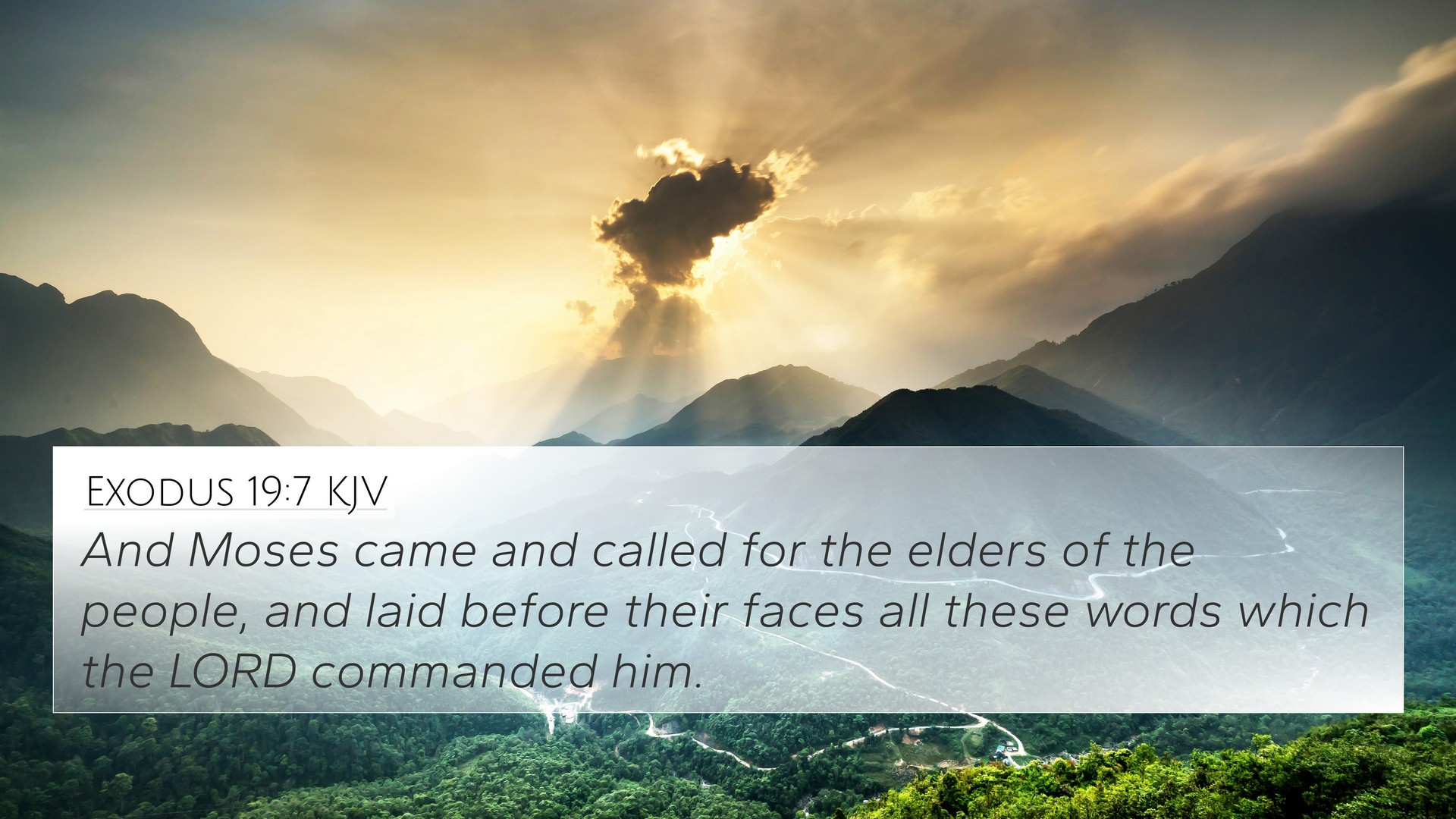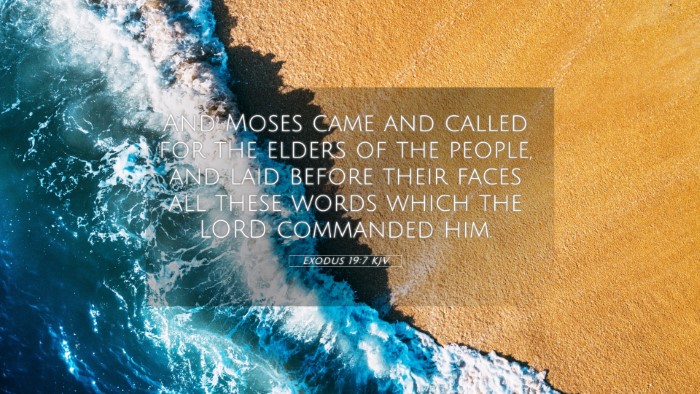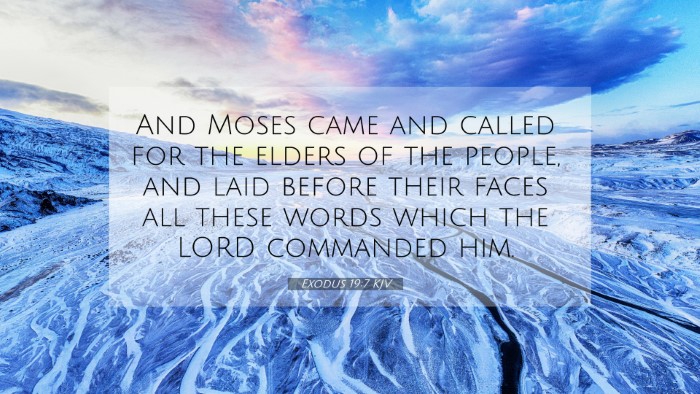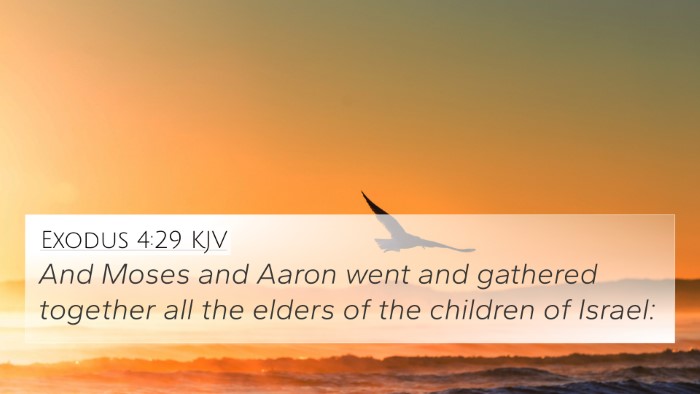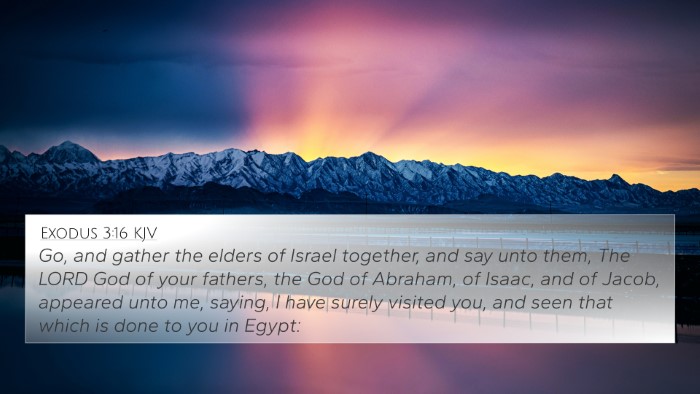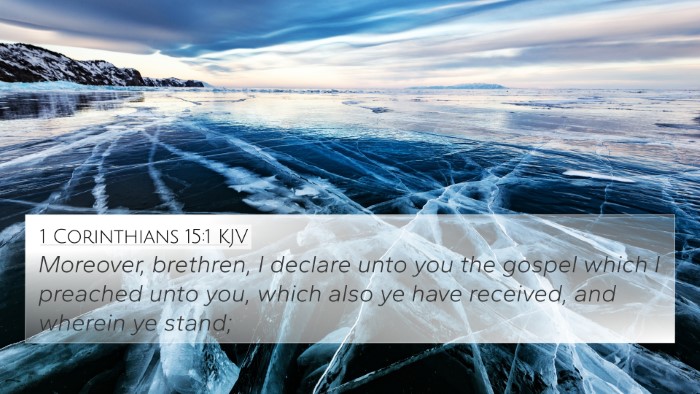Understanding Exodus 19:7
Exodus 19:7 states:
"And Moses came and called for the elders of the people, and laid before their faces all these words which the LORD commanded him."
In this verse, we witness a pivotal moment in Israel's history as Moses communicates God’s commandments to the leaders of the people. This act exemplifies a significant instance of biblical leadership, obedience, and divine revelation. Below we explore the depth of this verse through insights from public domain commentaries, connecting it with various other scriptures and themes within the Bible.
Meaning and Insights from Commentaries
Matthew Henry: Henry emphasizes the importance of leadership in conveying God's word to the people. He notes how Moses, as the chosen leader, acted as a mediator between God and Israel, illustrating the role of prophets throughout biblical history.
Albert Barnes: Barnes comments on the inclusivity of Moses' approach, where he involves the elders, thereby establishing a communal responsibility towards adhering to God's commandments. This highlights the foundational aspect of collective obedience in the nation of Israel.
Adam Clarke: Clarke adds to the analysis by noting that this moment marks a significant step toward the formal establishment of Israel as a nation in covenant with God. The communication serves as a prelude to the giving of the Law, which is meant to guide the moral and communal life of the people.
Cross-References and Connections
Exodus 19:7 parallels with several other biblical passages that enhance its meaning and significance:
- Exodus 3:10 - God's call to Moses to lead His people out of Egypt.
- Exodus 20:1-17 - The giving of the Ten Commandments as a continuation of God’s instructions.
- Deuteronomy 5:1 - Moses gathers the people to hear the commandments, showing continuity in leadership.
- Matthew 28:19-20 - The Great Commission reflects Moses' role in conveying God's message.
- Hebrews 3:5 - Acknowledgment of Moses as a faithful servant in God's house.
- 1 Peter 2:9 - The concept of a chosen people, akin to Israel's covenant relationship.
- Acts 7:38 - Reference to Moses leading the people and receiving living oracles.
- James 1:22 - The necessity of being doers of the word, reflecting Israel’s response to Moses’ call.
- Romans 10:17 - Faith comes from hearing the word of God, showing the significance of proclamation as seen in Exodus 19:7.
- John 5:46 - Jesus' affirmation of Moses' writings as testifying of Him, linking the Old and New Testament.
Thematic Connections
This verse is crucial for understanding broader themes in scripture, such as:
- Divine Communication: The process through which God reveals His will to humanity.
- Leadership and Responsibility: The role of leaders in guiding their communities in faith.
- Covenantal Relationship: The ongoing agreement between God and His chosen people, emphasizing obedience and blessing.
- Community and Collective Faith: The significance of communal adherence to God’s commandments.
Cross-Referencing Tools and Methods
Utilizing a bible concordance or a bible cross-reference guide significantly enhances one’s understanding of scripture by identifying connections between biblical texts. Exploring cross-referencing Bible study methods enables one to appreciate the intricate web of relationships within the Bible.
Conclusion
Exodus 19:7 serves as a powerful reminder of the importance of both hearing and executing God's word. The role of Moses as a mediator provides a paradigm for understanding biblical leadership and the faithful transmission of divine instruction. By utilizing bible reference resources and engaging in comparative analysis, believers can deepen their understanding of scripture while recognizing the profound connections between various passages.
SEO Keywords
For those seeking further exploration, consider how to find cross-references in the Bible or examine links between the Prophets and Apostolic teachings. Engage in a comparative study of Pauline epistles to identify similar theological themes that resonate throughout scripture.
